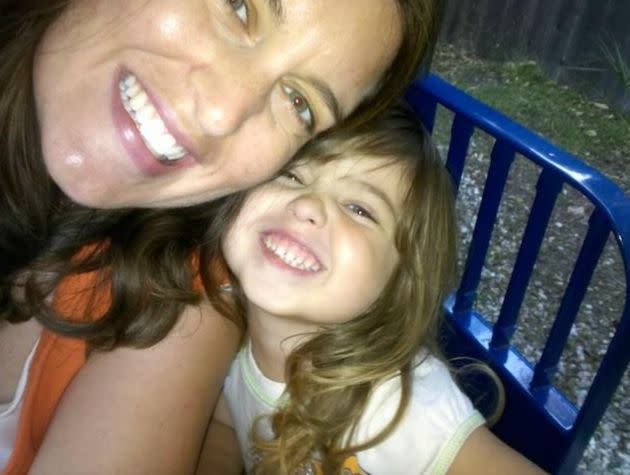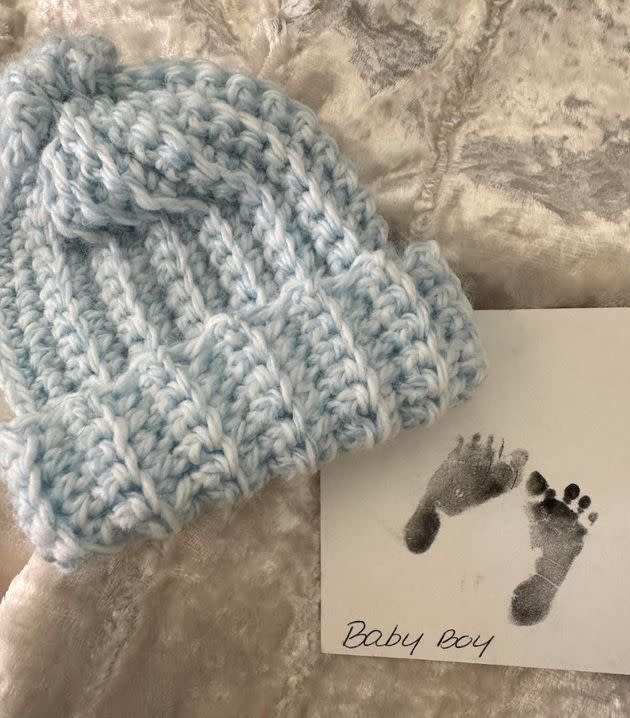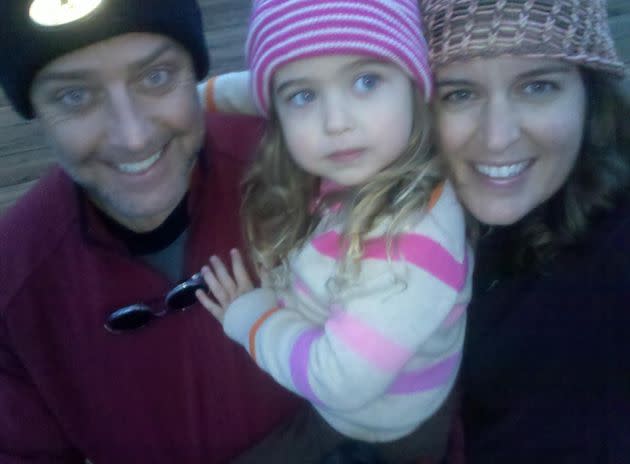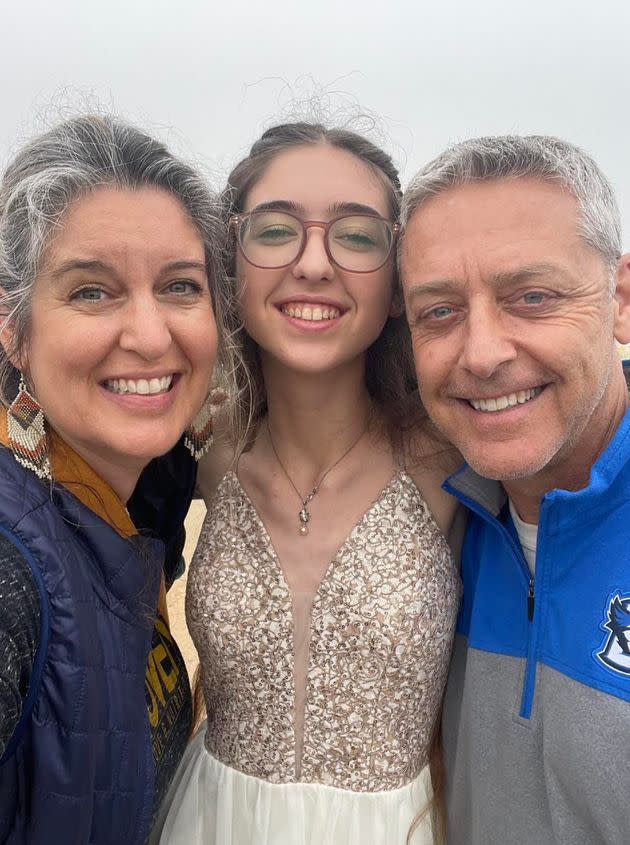My 3-Year-Old Began Saying These 3 Devastating Words To Strangers. I Wasn't Prepared For What Happened Next.

My husband and almost 3-year-old daughter came through the door to my hospital room with shining eyes.
“We just met a woman in the elevator who is here to visit her new grandchild, and Ada told her about Benjamin. She wants to come talk to you,” he told me.
My heart sank.
I was two days out from the stillbirth of our son. Less than 48 hours earlier, I’d been hustled into the operating room, sliding past my doctor talking with the NICU team before he scrubbed in to stop me from losing any more blood after a placental abruption.
Grief-stricken and lost, the last thing I wanted to deal with was another stranger. The revolving door of nurses was exhausting enough, despite their gentle hands and kind smiles.
They’d put me at the end of a hall to recover, far away from the cries of living babies and celebrating families. There was a sign on the door warning those about to enter that there was grief in this room instead of new life.
Since being wheeled in, I’d waited for my husband to fly in from across the country after waking him in the middle of the night to say, “Come home.”
We’d named our son, held his tiny body and let someone take him from our arms. I’d refused photos with him — one of my biggest regrets — not wanting to document the most excruciating moment of my life. I stood for the first time after surgery, almost fainting from the pain, and I held my daughter and cried with relief that I was still alive. I vacillated between numbness and wailing, exhausted to my core. I wasn’t ready to go home, but I wanted to be left alone.
Twenty minutes later there was a knock at the door and an elegant woman in her early 60s stepped inside. Her hair was salon-curled, her brows penciled in and her lipstick impeccable. She smiled as my husband stood to greet her. Stopping at the end of my bed, she took a deep breath.

“I hope you don’t mind, but I’d like to tell you my story,” she said. “My son died too, 35 years ago. I wasn’t allowed to see him. I wasn’t allowed to mourn him. I’ve only ever told a few people about him, but I wanted to share him with you.”
She told us about mistakes made by doctors, and the disorienting grief of waking up expecting to hold a newborn and instead being given the news that her son was dead and already gone. She shared how surreal it was to never lay eyes on him, to not be allowed to speak of him, to be told to hurry up, get pregnant again, and move on. We cried together over our lost boys.
When she left, she patted my hand.
“Thank you for letting me talk about him,” she told me.
I held on.
“Thank you for reminding me I’m not alone,” I said.
This happened often over the next few months. Having lunch at the local taco joint or standing in line at the grocery store, I would be wearing my brave face, pretending to be fine, and my cherubic child would lean forward and announce, “Our baby died.”
She hadn’t yet learned not to talk about grief in public or that stillbirth is a form of loss so painful, most folks would prefer to ignore it. She was too young to know when a stranger asks you how you are, you’re supposed to say, “I’m fine,” and move on. She wanted the world to understand she wasn’t going to be a big sister after all.
Sometimes the conversation would stutter and die, but often, it would crack wide open, and as strangers, we’d find ourselves in the quicksand of grief, holding each other up with watery eyes. I heard stories about miscarriages and dying mothers, about sudden accidents and prolonged illnesses. I heard pain and struggle, but mostly, I heard love.

I learned people wanted permission to talk about their losses, even for a moment in the checkout line. They wanted to be able to say, “I hurt too.” I learned that my grief was better served by saying, “I’m having a hard day,” than pretending I was fine. I had to learn to exist within my grief to survive. I needed to understand its shape and weight, its texture and timbre. And in being with myself in my hardest moments, I learned how to be with others in theirs.
It surprised me how those conversations helped to sustain and nourish me. Being out in the world still wasn’t easy, but if I could show up with honesty and tenderness, I was almost always met with those in return.
I didn’t have a black armband to let others know I was grieving, but I did have a 3-year-old whose willingness to tell the world, “Our baby died,” paved an unexpected way forward and helped me recognize I wasn’t alone.
My daughter is 16 now. She doesn’t lead with her little brother dying anymore, but grief continues to be a subject of conversation in our home. The other day she mentioned a friend who seems to be pushing people away as she gets closer to finishing high school. When this friend was little, her mom died in an accident that tore a hole in our community.
We talked about the lingering effects of grief and how it can make being vulnerable harder, how it can drive us to steel ourselves in unhelpful ways against future loss.

I want my daughter to be grief-informed. I want her to see loss as a possible reason for behavior she doesn’t understand — in herself or someone else — so she has compassion and can seek or offer support. My hope is she will continue to open doors to connection as a young adult the way she did so naturally as a child.
Recently I found myself standing in a sweltering parking lot, tears spilling over as I listened to a friend’s bewilderment, anger and disbelief over her brother’s sudden death. She had the look of the newly bereaved, wearing shock like a suffocating second skin — the look I’m sure that woman saw in me 14 years ago in my hospital room. For a few moments, my friend met me with honesty, whispering, “I’m not fine,” and in the quicksand of grief, I held her up so she could breathe.
Alana Sheeren is a writer, coach, TEDx speaker, and author of the mindfulness journal, 30 Days of Noticing. She holds a Bachelor of Fine Arts in theater, and a Masters of Arts in clinical and community psychology, and has a passion for healthy grieving, raising empowered kids and posting sunset pictures on Facebook. She lives by the ocean in Southern California with her husband, daughter and snaggle-toothed rescue dog.
